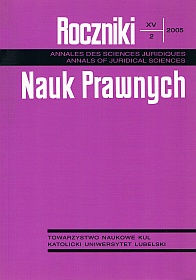The Theological Character of Canon Law and Its Ordering Role in the Fellowship of the Church
Abstract
The regulations of the church canon law in the fellowship of the Church are subjects to growing criticism. Today, however, one seeks justification for canon law in a theological reconstruction. The theology of canon law, through self-reflection and roots in the Divne Revelation, is able to ward off any anti-juridical manifestations and trends. They reverse the sense of the law of the Church as an instrument of order. The Church leads to salvation and it is because of human weakness that the church lawgiver gives his dispositions, so that the fellowship of faith could live in order and harmony. The present study interprets the justifications for the necessity of law in the fellowship of the Church. It draws on history, where it was harshly criticised, e.g. M. Luter and R. Shom. The Church of Jesus Christ, however, lasts and is disseminated. This is owing to divine elements which the Church received from Him. The Church is a Divine-human fellowship, therefore there is a need for visible mechanisms by which to govern it. Codes, Instructions, Constitutions, or, eventually, the Scriptures and particular law are expressions of it.
The church fellowship has all the essential elements of a human fellowship, including the authority of power and legal order. In the 19th century ecclesiology rendered the fellowship of the Church as a “perfect fellowship.” According to the Spanish canonist and theologian Lamberto de Echeverrii, one should point at three elements: 1) Jesus Christ wanted to have the Church as a perfect fellowship; this is expressed in a visible and charismatic fellowship; 2) it corresponds to a certain legal order; 3) similar to the state order.
Ecclesia is a multitude of people unified by the ties of faith and love designed to lead its members to salvation, using at the same one's own resources which lead to it. We mean here such spiritual goods as the sacraments. The church fellowship established by Christ the Lord is a perfect fellowship endowed with the threefold power to govern, teach and sanctify. The power to govern is legislative, executive, and judicial. This is a hierarchic model of the Church. Therefore in the sacramental nature of the ecclesial fellowship there is a possibility and necessity to establish legal norms. The Church appears as a historical and social reality imbued with the presence of God. Christ is present in this reality as a whole and in its particular members. Rich in heavenly gifts it is at the same time earthly, and as the Mystical Body and the People of God it is a hierarchic society. The paper consists of six paragraphs: 1. The context and characterisation of canon law; 2. The binding power of canon law; 3. The sense of canon law; 4. The permanent elements in the fellowship of the Church; 5. The salvific action of the church lawgiver through the law; 6. Summary. The paper shows the theological foundations of canon law, especially its permanent elements as the Word of God, the sacraments, the will of the lawgiver, faith, and grace. This topic is important and should be continued in scientific considerations.
Copyright (c) 2005 Roczniki Nauk Prawnych

This work is licensed under a Creative Commons Attribution-NonCommercial-NoDerivatives 4.0 International License.


